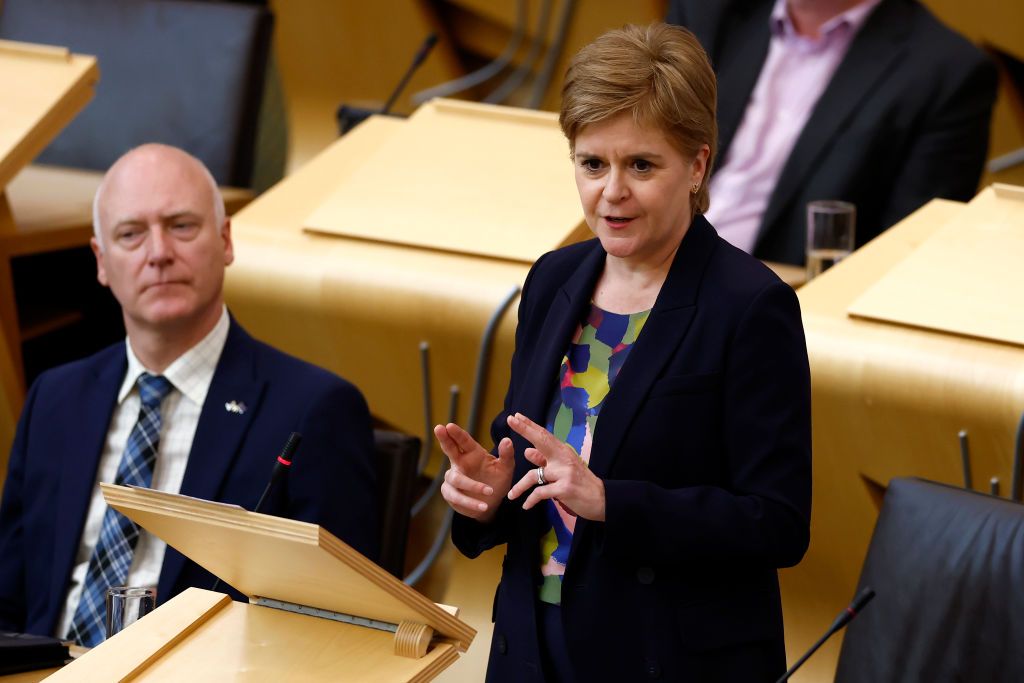Nicola Sturgeon’s first speech back in Holyrood was a nostalgic return to the past. It felt natural to see the former first minister holding court again, speaking with a presence a leader would. So natural, in fact, that even the Presiding Officer couldn’t help herself from referring to Sturgeon as ‘First Minister’ – to much amusement in the chamber.
Widely expected to focus on childcare, Sturgeon’s speech verged more into the philosophical. She mused about the nature of modern political discourse, admitting that she herself had played a role in creating division. ‘I accept my share of responsibility,’ she told parliament. Urging parties to debate constructively, she went on: ‘Polarisation in politics is much maligned. It is the paralysis of action that it can result in, though, that should worry us most.’
It is hardly surprising that inaction is on the former first minister’s mind: her own party has faced its fair share of policy struggles in recent months. Legislation like the deposit return scheme, the Highly Protected Marine Areas (HPMAs) and the gender bill have all experienced major delays and, notably, were not much highlighted in Humza Yousaf’s programme for government. In reference to the expansion of childcare support and Scotland’s climate commitments amongst other policy areas, the former first minister was clear that ‘progress needs to be accelerated’.
And Sturgeon’s speech served as a gentle reminder to those who have criticised Yousaf’s plans for being ‘unambitious’; she spoke of the importance of ‘mature debate’ on how government pays for the policies it proposes and the need to reflect on the ‘powers this government has and needs’. Sturgeon’s was a softer rebuke to the UK government than Yousaf’s words on Tuesday, but reading between the lines leads to the same result: if the Scottish government hasn’t gone far enough, it’s Westminster’s fault.
Climate policy dominated too: the former first minister took the chance to reframe the SNP’s narrative, pointing out that critics often ‘mischaracterise’ her stance as wanting to ‘turn off the North Sea taps off overnight’. Instead, she said that her attention is on turning on ‘new taps’, bringing the focus back to ‘building renewables capacity as quickly as possible’ and criticising the UK government’s North Sea plans – to create thousands of jobs in oil and gas and focus on carbon capture, use and storage (CCUS) – for coming at a cost to the environment and making only a ‘marginal, at best, difference’. There remain concerns amongst those working in the oil and gas industries that the Scottish government is less interested in protecting – or replacing – their jobs than it is about being seen to progress its climate commitments. Yousaf’s government will have to ramp up their ‘just transition’ plans if it wants to strengthen its support base in the north.
Sturgeon lent her support to Yousaf’s programme for government, saying on Wednesday that she ‘enthusiastically commends’ it – though she also pointed out that many of his propositions are ‘building on progress’. While it has been suggested that Sturgeon has been deliberately keeping a low profile so as not to overshadow Yousaf, it’s hard to overlook the fact that the former first minister still, even while the police probe remains ongoing, has more gravitas than her successor. She seems to view her new role on the backbenches as being that of a wise elder, ensuring debates remain civil and disagreements agreeable. Her return to parliamentary speeches, however, may not be entirely good news for a First Minister who has already struggled to build his own brand in the shadow of the SNP finances fallout. Criticised for too often trying to please everyone and lacking the authority of his predecessors, it is imperative for Yousaf that he doesn’t let himself become overshadowed.







Comments